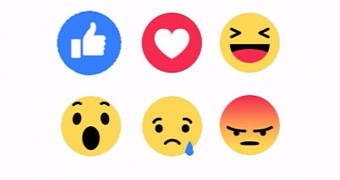It's been about a year since Facebook rolled out the reaction emoji buttons and they seem to become more and more important to the way our newsfeeds are shaped because the social network actually takes them into account.
See, if you thought that Facebook was simply giving you a way to better express yourself when interacting with a post or picture, you're wrong. The company didn't just want to give you emojis for "love," "haha," " sad," "wow," and "angry" just to make you happy, it wanted to see what makes you tick so it can better build that newsfeed you scroll through every day.
Facebook admits that, for instance, reacting with love, sad or angry emoji indicates that those individuals feel strongly about the subject they encountered on their feeds, certainly more than about those topics they simply tap "like" for.
"Over the past year we've found that if people leave a reaction on a post, it is an even stronger signal that they'd want to see that type of post than if they left a Like on a post," Facebook's statement reads.
News Feed algorithm adapts
Therefore, Facebook has announced that the News Feed is being updated to weigh reactions a little more than Likes when taking into account how relevant the story is to each person.
That being said, love trumps like, much like in real life. So, if you want to make sure you see more cat videos on your feed, or those mouth-watering video recipes, you might want to start tapping "love" rather than "like" so Facebook will know without a doubt that's what makes you pull through a work day.
Facebook has also revealed that, over the past year, Love was used the most out of all emojis, trumping "sad" and "hate." In fact, it accounted for half of the 300 billion emoji uses recorded thus far.
That being said, if you want to keep Facebook from knowing even more about you, you might want to resist choosing anything else than "like."

 14 DAY TRIAL //
14 DAY TRIAL //